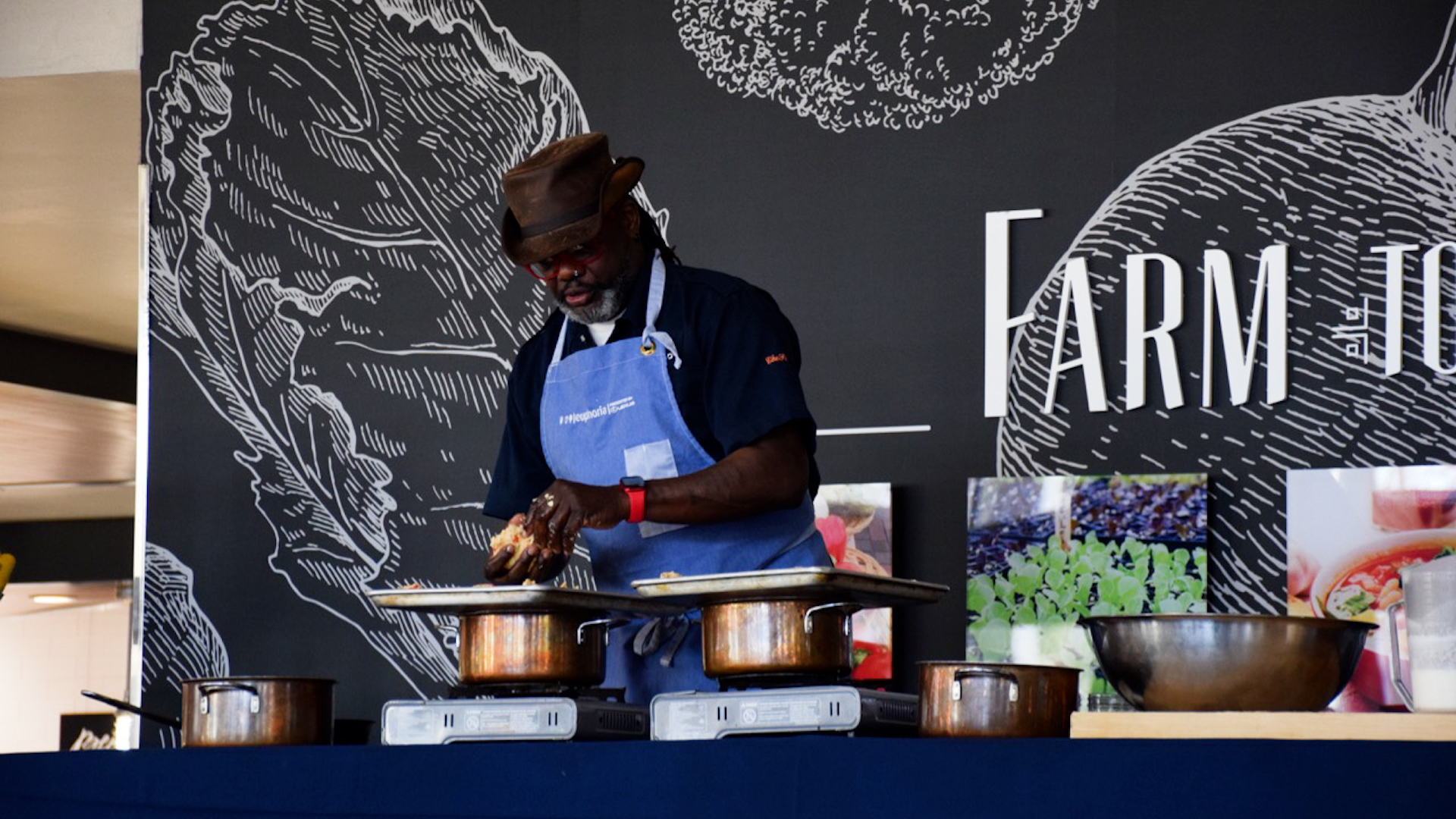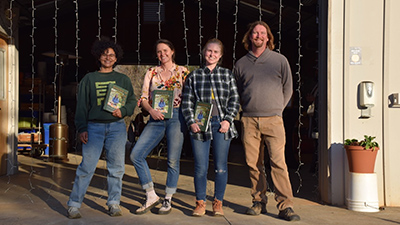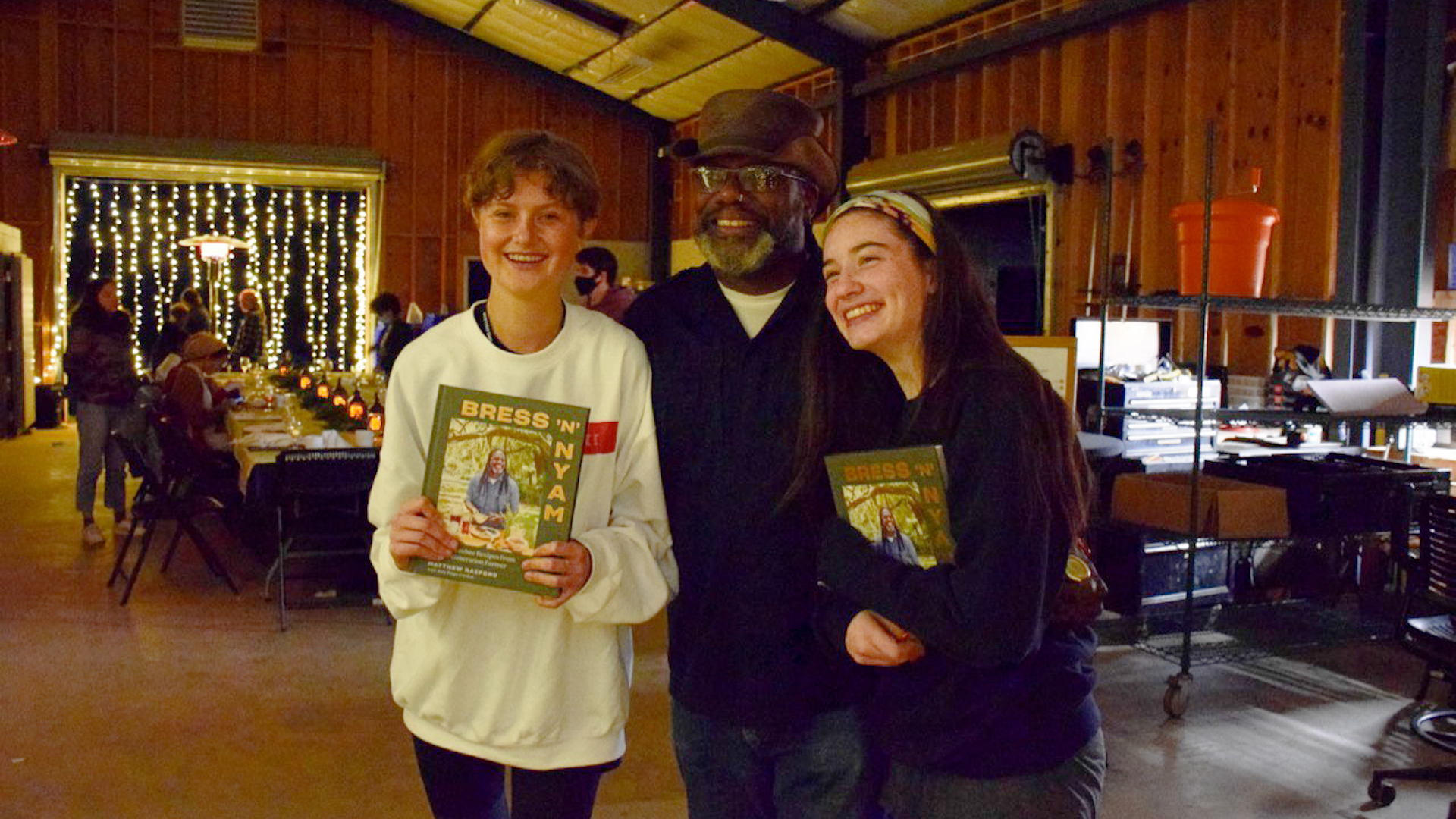Matthew Raiford spoke with students, gave a cooking demonstration, and visited the Oxford Farm with his new book "Bress 'n' Nyam: Gullah Geechee Recipes from a Sixth-Generation Farmer."
One of the unique features of an Oxford education is access to the Oxford College Organic Farm, which grows healthy food that goes straight to the dining hall or is offered to the larger community through a seasonal farmer's market. But the farm offers more than just fresh produce—paid student workers till the land and plant seeds, classes visit to study soil or scenery, and visitors stop by to share their knowledge and enthusiasm.
Matthew Raiford—a former chef for the U.S. House of Representatives who returned to his ancestral farm in coastal Georgia where he now works the land and cooks—visited Oxford in February with his new book Bress 'n' Nyam: Gullah Geechee Recipes from a Sixth-Generation Farmer. He held a cooking demonstration on campus where he talked about his journey back to Georgia and signed books. Later, he attended a special dinner on the Oxford Farm with students.
"In a way, it's a dream come true for the farm to have a guest like Matthew," said Daniel Parson, Oxford's lead farmer-educator. "He's a farmer and a chef. The land he's working on and his family history are really fascinating. Those are the types of stories we want to tell about Georgia agriculture: that it's not just big farms, it's also small farms and farms with history."
In his book, Raiford describes his experience leaving behind an established culinary career to return to his family's farm in the Brunswick, Ga. area, where he grew up in the Gullah community: "I knew it would be hard coming back," he writes. "Not just the farming, but also as a Black man in the South who cooks in a kitchen and works the land. That's a lot of past to reckon with."
The Gullah people are African Americans from what is often called the Lowcountry—the coastal regions of South Carolina, Georgia, and the Sea Islands—as well as parts of Northern Florida and North Carolina. The Gullah culture and language—a creole of a variety of African influences and English—formed on plantations from enslaved communities and have been preserved for hundreds of years. In Gullah, "bress 'n' nyam" means "bless and eat."
After years away, Raiford had to re-establish himself—both as a chef and as a resident of the Georgia Lowcountry. In 2018, he was named a semi-finalist for Best Chef in the Southeast by the James Beard Foundation. He has also served as executive chef at Little St. Simon's Resort and opened the "hands-on cooking space" The Farmer and the Larder in Brunswick, in addition to his farming.
"The land's been in my family since 1874, so I am now the sixth generation to be farming on it," he said. "My children are the seventh who have planted, harvested, and eaten from a crop off this land. I think my time away shaped and molded my thought process, especially with me understanding that my heritage is Gullah Geechee and that the land and the sea are what we have been able to survive off of. Being able to put that in action and show other people to do that has been phenomenal."

For the demonstration, the Oxford Farm provided a handful of fresh ingredients while Raiford cooked and chatted with those in attendance. The menu included "Nana's chicken stew" (chicken and dumplings), "mess'o'greens" (braised collard greens), and "Effie's brown sugar molasses pound cake" served with a fresh blueberry compote.
"The conversation was robust," Raiford said of his visit with students, many of whom he asked what they hoped to major in and quickly explained how each response related back to our food systems. "I think we often forget that the three reasons students go to get this education are for food, clothing, and shelter—to do better in those ways. It's important to show them how collectively they are part of a web of good, clean, and fair food."
When it came time for dinner on the Oxford Farm, Lydia King, a student farm worker, took a moment to enjoy the ambience:
"The barn, which I see all the time during my work shifts, was transformed," she said. "There were string lights hung all around, and there was a large banquet table in the center. We all got to talk to Matthew, as well as his wife, Tia. They told us about their incredible careers, as well as their current passions. And, of course, the food was incredible."
As King describes it, the menu started with "honey butter biscuits, moving on to a whipped feta dish, then a main of herbed fish, finishing with a dessert of strawberry shortcake."
"I think Matthew felt really comfortable here on the farm," Parson said. The two first met years ago at conferences held by Georgia Organics, where Raiford now serves as president. "We're aligned in our production methods, so it was great to be able to show him what we're doing. For our farm students, some of them are taking classes that touch on agriculture issues, but all of them are working here on the farm and can relate to what he had to say."
Raiford was particularly impressed by both the farm and the Oxford Dining Hall, where he noticed a board that stated the "who, what, when, and where" of the food's origins, which are often directly from the Oxford Farm itself.

Daniel Parson with staff at the Oxford Farm
Parson hopes to continue to inspire students like King to show interest in food systems and agriculture, whether through events like Raiford's visit or just keeping day-to-day operations running smoothly.
"I've absolutely loved working on the farm," said King, who is studying anthropology and human biology. "It's actually one of the main reasons that I was excited to come to Oxford. It's taught me so many practical skills. [I enjoy] the times I share with the people there. It's always fun to weed a bed or fix a fence together, all while discussing weekend plans or fun memories."
The farm's offerings are not limited to the students who work on it. Professors bring their classes to learn: biology students sample the soil for research, creative writing students write about sense of place, economics students examine how the farm interacts with markets—there are no shortage of opportunities to get involved.
This blend of education and real, practicing agriculture left Raiford inspired as he returned to his own farm near the coast.
"The experience to bring Bress 'n' Nyam to Oxford was amazing within itself," he said. "I think the food system you all are trying to create is very important and something that the students can carry with them as they go to other places. It's the understanding that we can vote with our fork, and I think it's amazing that Oxford has put that into place."


